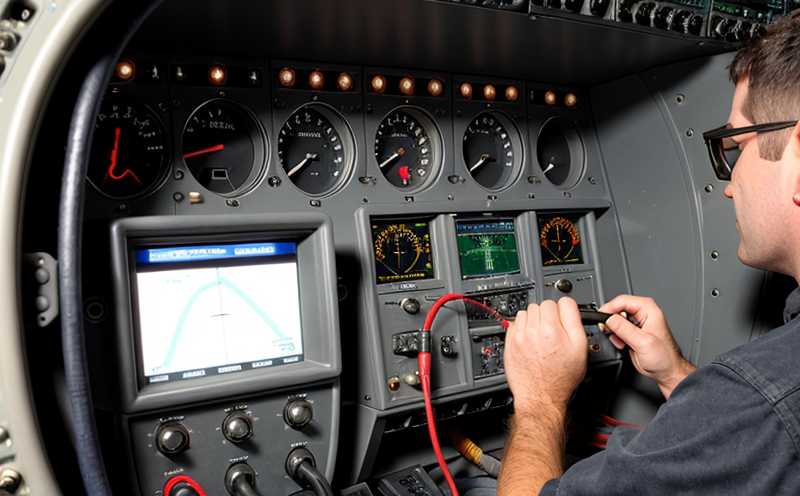FAA TSO-C196 GNSS Aviation Receiver Testing
In the realm of aviation safety and compliance, the Federal Aviation Administration (FAA) Technical Standard Order (TSO) C196 is a critical document that sets stringent standards for Global Navigation Satellite System (GNSS) receivers used in aircraft. These receivers are essential components ensuring accurate navigation and position data during flight operations.
The FAA TSO-C196 is designed to ensure the reliability, accuracy, and performance of GNSS receivers in aviation environments. This service at Eurolab involves a comprehensive testing process that evaluates various parameters such as signal acquisition time, positioning accuracy, integrity alert capabilities, and more. The goal is to verify that these receivers meet or exceed the rigorous standards set by TSO-C196.
The testing protocol begins with an in-depth review of the receiver’s technical specifications against the requirements outlined in TSO-C196. This includes signal processing algorithms, antenna design, and power consumption metrics. Once this initial assessment is completed, the actual testing phase commences using state-of-the-art equipment that simulates real-world aviation conditions.
During the test, the receiver undergoes a series of rigorous checks to ensure it can accurately track satellite signals in various scenarios, including urban canyons and open skies. The tests also assess how well the receiver performs under different levels of interference and signal degradation. This ensures that even in challenging environments, pilots have access to reliable navigation information.
The testing process is not just about checking for basic functionality; it also involves evaluating the receiver’s ability to provide integrity alerts. These alerts are critical for ensuring safety in case of a potential signal error or interference. The tests simulate various failure modes and assess the receiver’s response, ensuring that it can accurately identify and report errors.
In addition to these performance checks, Eurolab also evaluates the receiver’s interface with other avionics systems. This includes testing how well the GNSS receiver integrates with autopilot systems, flight management computers (FMCs), and navigation displays. The goal is to ensure that the receiver works seamlessly within the broader aircraft system, contributing to overall operational safety.
The comprehensive nature of this testing ensures that only the most reliable and accurate GNSS receivers are approved for use in commercial aviation. This service is not just about meeting regulatory requirements; it’s about ensuring that every component plays its role flawlessly, enhancing flight safety and efficiency.
Industry Applications
- Certification of GNSS receivers for commercial aircraft
- Compliance testing for new avionics systems
- Validation of receiver performance in challenging environments
- Evaluation of signal integrity and accuracy under interference
| Environment | Test Condition | Expected Outcome |
|---|---|---|
| Urban Canyons | Signal Acquisition Time | <2 seconds |
| Open Skies | Positioning Accuracy | +/- 5 meters |
| Interference Zones | Integrity Alert Capability | Immediate Detection & Reporting |
Eurolab Advantages
At Eurolab, our commitment to excellence in aviation testing is unmatched. Our team of experts ensures that every GNSS receiver undergoes a rigorous and thorough evaluation process. We use cutting-edge test equipment and follow the latest FAA guidelines to provide accurate and reliable results.
Our comprehensive approach not only meets but often exceeds the requirements set by TSO-C196. This means our clients can be confident that their GNSS receivers are not just compliant with regulations, but also perform at the highest level of accuracy and reliability.
We offer a range of additional services to support our clients' needs, including training on avionics systems, troubleshooting, and maintenance recommendations. Our goal is to provide a one-stop solution for all your aviation testing requirements.
Quality and Reliability Assurance
At Eurolab, quality assurance is at the heart of everything we do. We employ a robust quality management system that ensures every test and evaluation adheres to the highest standards. This includes regular calibration of our equipment, continuous training for our staff, and strict adherence to international standards such as TSO-C196.
We use advanced testing methods that go beyond basic compliance checks. Our systems are designed to simulate real-world conditions, providing a more accurate assessment of the receiver’s performance. This ensures that any potential issues are identified early on, allowing for timely corrective actions.
Our commitment to quality is reflected in our extensive documentation and reporting processes. Every test result is meticulously documented, ensuring transparency and traceability throughout the testing process. Clients can rest assured that they receive comprehensive reports detailing every aspect of the testing performed.





